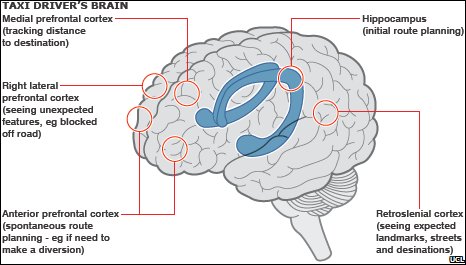 [Image: Route-finding and spatial perception in the brain; via the BBC].
[Image: Route-finding and spatial perception in the brain; via the BBC].
Like something out of a short story by China Miéville, “scientists have uncovered evidence for an inbuilt ‘sat-nav’ system in the brains of London taxi drivers,” the BBC reports. “They used magnetic scanners to explore the brain activity of taxi drivers as they navigated their way through a virtual simulation of London’s streets. Different brain regions were activated as they considered route options, spotted familiar landmarks or thought about their customers.”
Taxi cab drivers’ brains, we read, “even ‘grow on the job’ as they build up detailed information needed to find their way around London’s labyrinth of streets – information famously referred to as ‘The Knowledge’.”
It’s interesting to note, meanwhile, that this appears to be an almost complete retread of news released more than eight years ago. There we learn not only that “the hippocampus is at the front of the brain,” but that it “was examined in Magnetic Resonance Imaging (MRI) scans on 16 London cabbies.”
Cabbies’ brains, that article reports, “‘grow’ on the job.”
However, it’s also interesting to speculate here that “sat-nav” was not referred to by that earlier article because certain technologies – such as dashboard navigation and handheld GPS – simply had not yet reached an adequate price-point, or the required level of social acceptance, for “sat-nav” to be useful to that writer as a metaphor.
If this were true, then perhaps you could track the infiltration of GPS and sat-nav technologies into the fabric of everyday life by the speed with which they have become recognizable as urban-spatial metaphors.
(Via Boing Boing and Geoffrey S. George).